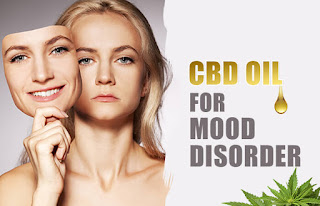What are Mood Disorders?
Mood disorders are mental health disorders associated with significant morbidity and mortality, being a major risk factor for suicide, substance abuse, poor outcomes of medical conditions, and impaired functionality. It is characterized by flattening of mood, loss of emotional expression, and retardation of thought and movements. Individuals who have depression usually have a depressed mood, loss of interest in activities they were usually interested in, sleep disturbance, loss of energy, and reduced ability to thick or focus.
The American Psychiatric Association’s Diagnostic Statistical Manual of Mental Disorders, Fifth Edition (DSM-5) categorizes depressive disorders into major depressive disorder, persistent depressive disorder, premenstrual dysphoric disorder, disruptive mood dysregulation disorder, and depressive disorder due to a medical condition. However, all these classes of depression are characterized by the presence of a sad or irritable mood with associated difficulty in thinking, concentrating, and carrying out normal physical tasks, impairing the individual’s daily functioning.
Stats about Mood Disorder
Between 2009 and 2012, approximately 7.6% of Americans aged 12 and above were diagnosed with a mood disorder and it was more common among females and persons aged 40 and 59. In 2015, about 16.1 million adults aged 18 and over had a minimum of one depressive episode in the previous year.
Depression has been found to occur in children at an incidence rate of 0.9% in preschool-aged children, 1.9% in school-aged children, and approximately 4.7% in adolescents. In prepubertal children, depression occurs in boys and girls at an equal rate. Generally, depression in men and women has the highest rates in those aged between 25 to 44 years and the incidence of severe depression increases with age.
What are Traditional Treatments for Mood Disorders?
There is a wide range of treatments for mood disorders which have proven effective in improving symptoms. A combination of medications and psychotherapy is effective in reducing the symptoms of moodiness, and therapy with either form alone is often ineffective. Combination therapy has been found to increase the quality of life and improve treatment compliance in patients with mood disorders.
Advanced treatment techniques used for these treatments can include electroconvulsive therapy which uses high-energy electric stimulation, and bright-light therapy involving exposure of an individual with depression to bright light at an intensity of 10,000 lux for a period of one hour in the morning.
Therapy for Mood Disorders
Psychotherapy is often combined with medications in the treatment of mood disorder. There are different types of therapy for depression and these can be grouped based on their efficacies. Therapy is considered “efficacious and specific” if studies in at least two settings (hospital, home therapy, rehab center etc.) have proven it more effective than medications. Therapy is considered “efficacious” if it has been proven from at least two settings that it is superior to no treatment at all, and it is “possibly efficacious” if it has been proven effective in at least one study in a single setting.
Examples of efficacious and specific therapies include cognitive behavioral therapy, problem-solving therapy, and interpersonal therapy which help the individual modify their behaviors and interpersonal relationships. An example of an efficacious therapy includes mindfulness-based cognitive therapy to prevent a recurrence or relapse, and an example of possibly efficacious therapy is continuation cognitive therapy to prevent recurrence by helping the individual develop positive thinking and behavioral patterns.
Medications for Mood Disorders
Medications used for treating mood disorders are of different classes, each with a different mechanism of action, characteristics, and side effects. Some of these drugs include Fluoxetine (Prozac), Citalopram, Amitriptyline, Imipramine, and Nortriptyline. These drugs generally increase the concentration of stimulant substances in the brain to improve depressive symptoms.
Home Remedies for Mood Disorders
Patients with depression could benefit from a number of home remedies which could help to improve their symptoms, in addition to antidepressants and therapy:
- St. John’s wort – This plant, although not approved for treatment of depression by the FDA, has been linked with increased amounts of serotonin in the body correlating to improvement of depressive symptoms.
- Omega-3 fatty acids – Omega-3 fatty acids are commonly found in fish such as salmon, sardines, and trout, and this substance has been linked to improvement in depressive symptoms.
- SAM-e – S-adenosylmethionine (SAM-e) is artificially designed to function like chemicals in the brain which elevate mood. It is considered a supplement useful in improving symptoms of depression.
- Folate – Folic acid which is found in a number of foods such as beans, lentils, dark leafy greens, and fortified cereals have been found to improve the effectiveness of medications used in treating the disorder.
What is CBD?
Cannabidiol (CBD) is a naturally occurring chemical compound found in the hemp plant. It is one of the numerous unique compounds called cannabinoids which naturally occur in hemp. Generally, cannabinoids can be produced in the body (these are known as endocannabinoids) or found in the hemp plant as phytocannabinoids. CBD is industrially extracted from the cannabis plant and separated from the other cannabinoids, representing about 40% of cannabis extracts.
CBD is a phytocannabinoid which helps to stimulate the regulation of the central nervous system. CBD, therefore, helps supplement the effects of endocannabinoids in regulating appetite, mood, functions of the immune system, sensation, and keeping our bodies working normally. CBD oil is made from hemp plants and can be purchased legally in the United States. CBD is available in different forms such as tinctures, concentrates, capsules, sprays, tapes, and topicals.
CBD Oil Effects
Although CBD oil has not been approved by the FDA for the treatment of any condition, there have been several studies demonstrating some of its health benefits:
- CBD has been shown to have anti-oxidant properties which means that it is capable of mopping up toxic substances obtained from food or generated in the body. These substances are often at the center of inflammatory conditions such as myocardial infarction, inflammatory bowel disease, and stroke.
- Oxidative stress caused by the release of these toxic substances causes age-related diseases such as Alzheimer’s disease and Parkinson’s disease and CBD has been found to protect against these degenerative diseases of the brain and reduce their clinical progression in patients suffering from them. CBD may also help in the clinical improvement of some autoimmune disease such as lupus and rheumatoid arthritis.
- Clinical trials have shown that CBD oils are effective in the treatment of epilepsy and other seizure disorders.
- Studies have shown that CBD may have therapeutic benefits for brain disorders such as psychosis, depression, and multiple sclerosis.
- Other benefits of CBD are currently being investigated, including its effects on anxiety and depression, as well as on social anxiety disorder and post-traumatic stress disorder.
Does CBD Get You High?
CBD is a non-psychoactive form of cannabinoid which has been found not to interfere with the cognitive functions of the brain. It does not get you “high,” in contrast to THC, which alters the cognitive functions of the brain.
Is CBD Addictive?
According to a recent report by the World Health Organization (WHO), CBD is not addictive and it has no potential for abuse or dependence. This is mainly because CBD does not contain any addictive substances, in contrast to THC and some cannabinoids which contain such and are, therefore, capable of being addictive.
Is CBD Safe?
There have been extensive reviews on the toxic potentials of CBD and reports have revealed that CBD has relatively low toxicity. It has been found to be safe with little potential for adverse effects. CBD was found to have no effect on fetal development and other bodily functions. Generally, CBD does not produce the adverse effects seen with THC and other psychoactive cannabinoids. However, reports demonstrate that some reactions may occur as a result of its
interactions with other drugs co-administered with it.
How Could CBD Help with Mood Disorders?
CBD has been found to be effective in the treatment of mood disorders. While CBD does not cure the condition, it has been linked to the improvement of the symptoms.
The cannabinoids produced in our bodies (endocannabinoids) help to regulate several functions of the body such as mood, pain sensation, sleep, and appetite. These substances exert their actions by binding to specific points of brain cells called the receptors through which they potentiate the actions of a substance called serotonin which acts to improve mood and reduce stress levels. Serotonin also acts by binding to its receptors in brain cells. When these chemical substances bind to their respective receptors, they trigger a series of events within each brain cell stimulating processes that improve mood and stress control.
CBD has been found to help improve depressive symptoms by modulating the actions of the endocannabinoids and also potentiating the effects of serotonin by enhancing the activity of the receptors unto which serotonin binds.
Bottom Line: Can CBD Help You?
CBD is one of the naturally occurring chemical substances found in the cannabis plant and thou the stigma associated with the psychoactive counterpart, THC, has rubbed off on it, it has been shown to have immense health benefits in treating conditions such as anxiety, depression, mood disorders, and inflammatory diseases. CBD oil helps to significantly improve depressive symptoms and the individual’s quality of life. However, it should be noted that CBD does not provide a cure for the disorder, but leads to a better quality of life for the patient.
Resources
Disclaimer:
The information made available on this page is
based on studies and research as well as experiences from CBD product users.
For a medical condition always consult with a
healthcare professional before consuming CBD. These products are not intended
to diagnose, treat, cure, or prevent disease, ailment or skin condition. Any
information contained in or made available on our website is not intended to be
used as, or be a substitute for, healthcare advice or information from licensed
healthcare practitioners. Please consult a licensed health care practitioner
regarding any potential interactions or complications before using our
products.
This website https://pammysperfectdrops.blogspot.com
is not a part of the Facebook website or Facebook, Inc.
Additionally, this website is NOT
endorsed by Facebook or any other website in any way. Facebook is a trademark of Facebook, Inc.




Comments
Post a Comment